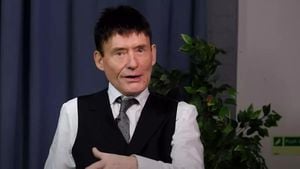The German Bundestag election held on February 23, 2025, has revealed significant shifts within the political scene, with the CDU/CSU reclaiming its status as the leading faction. According to preliminary results, the union achieved 28.6 percent of the second votes, improving from 24.2 percent in the previous election. This resurgence marks CDU/CSU's return to form after suffering substantial losses previously.
Notably, the AfD made remarkable gains, doubling its second vote share to 20.8 percent, making it the second-largest faction within the Bundestag for the first time. "Our victory marks a historic moment for our party," declared AfD leader Björn Höcke, emphasizing the need for political change following their electoral success. This outcome has unearthed sentiments among various factions, as Höcke asserted, "The Thüringer have not only voted out the Ampel coalition but also the Brombeer coalition," referring to the existing coalition of CDU, BSW, and SPD.
On the other hand, the Social Democratic Party (SPD), which had previously topped the last election, fell to third place with only 16.4 percent of the second votes, down from 25.7 percent. This decline has raised alarms within the party, reflecting discontent among the electorate. The environmental party, Bündnis 90/Die Grünen, followed the SPD with 11.6 percent, also experiencing declines from their past performance. The Left party managed to secure 8.8 percent, maintaining its position yet again as the smallest faction.
The election saw high voter engagement, with turnout reported at 82.5 percent, exceeding the 76.4 percent recorded during the last election. This increased participation reflects the public's heightened interest and response to the changing political climate.
Within the newly elected Bundestag, which will now consist of only 630 members (down from roughly 733 due to recent electoral reforms), the CDU holds 164 seats, including 128 direct mandate wins. Meanwhile, the AfD has seen its representation swell to 152 parliamentarians, significantly more than their previous count of 83. Comparatively, the SPD will send only 120 representatives, down from 206.
Overall, the electoral outcomes not only signal shifts within party strength but also reveal voter sentiment across Germany. The election results are already leading to discussions about coalition possibilities, with the CDU/CSU appearing to explore various partnerships within this new political arrangement.
The upcoming federal election committee is scheduled to finalize the official results on March 14, 2025, marking another key date for the new legislature as the country moves forward to interpret and react to the recent electoral changes.



